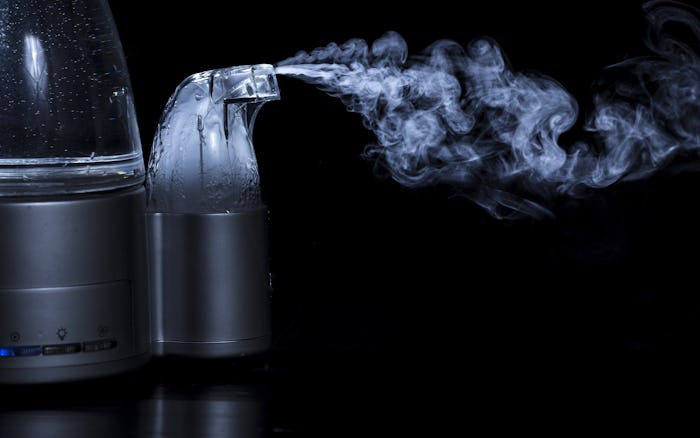Life

How To Decide If Your Baby Needs A Humidifier
There are so many gadgets and gizmos marketed to us first-time parents. It's truly an understatement to say it's almost impossible to decipher between the products you need and the produces that are nothing more than unnecessary fluff. So if you find yourself silently wondering, "Does my baby need a humidifier?" know that you're not alone. In fact, at least you're asking the question before you buy three. You know, just in case the other two break (or something).
While there are numerous kinds of humidifiers made available to parents and non-parents alike, HuffPost describes a humidifier as a "device [that] emits water vapor into a space to increase the level of humidity." The site goes on to say that, when used properly, "humidifiers can help to alleviate dry skin, chapped lips, nose bleeds, and other pesky cold-weather conditions. It can even help to reduce some snoring!" In fact, and according to The Mayo Clinic, humidifiers can also help "ease symptoms of a cold or another respiratory conditions."
While humidifiers absolutely do more good than bad, Good Housekeeping reminds potential buyers that "without regular care, a dirty humidifier could promote bacteria and mold growth." The Mayo Clinic takes it one step further, issuing the following warning to parents:
Although useful, humidifiers can actually make you sick if they aren't maintained properly or if humidity levels stay too high. If you use humidifiers, be sure to monitor humidity levels and keep your humidifier clean. Dirty humidifiers can breed mold or bacteria. If you have allergies or asthma, talk to your doctor before using a humidifier.
While there are potential risks associated with humidifiers, especially if they aren't used properly, The American Academy of Pediatrics (AAP) includes humidifiers on their list of nursery essentials and does recommend the use of humidifiers in babies nurseries to help clear stuffy noses. The Federal Drug Administration (FDA) also reminds parents not to give babies any medications designed to treat congestion, saying the "FDA doesn't recommend over-the-counter (OTC) cold and cough medicines for children younger than 2." In other words, a humidifier might be a safer alternative to the over-the-counter medications promising some reprieve from common cold symptoms.
Although a humidifier can be beneficial to a small child, they are not without risk. The AAP highlights the dangers of not properly cleaning humidifiers, mirroring Good Housekeeping's warning that a disregarded humidifier can result in an overgrowth of harmful bacteria and mold. The AAP also suggests parents only buy cold air humidifiers, saying:
"Steam vaporizers are not recommended because of the danger of scalding."
The Baby Sleep Site discusses how helpful white nose machines can be at drowning out background noise and creating a relaxing buzz that could potentially help your baby go to sleep and, perhaps more importantly, stay asleep. Many humidifiers make a low humming or whooshing noise, which can act like a white noise machine by replicating the sounds your baby heard inside the womb and helping babies to fall asleep and stay asleep longer.
When it comes to getting our precious little babies to sleep well, especially if they are suffering from a cold, us parents will try anything. Consider adding that humidifier to your list of nursery essentials to ensure your baby sleeps soundly.